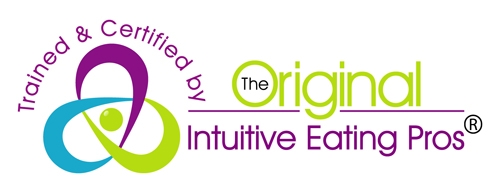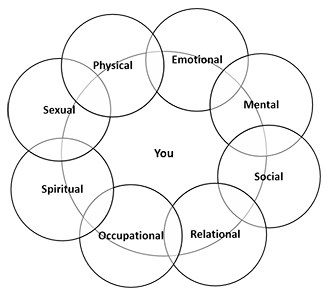What is Intuitive Eating?
“Intuitive eaters march to their inner hunger signals and eat whatever they choose without experiencing guilt or an ethical dilemma.”
-Evelyn Tribole MS RDN
So what is intuitive eating? Let me start by telling you what it is not.
Intuitive Eating is not:
- Another set of rules you must follow
- Another prescription for weight loss
- Another plan promising impossible things
- Another name for a restrictive diet
As a Certified Intuitive Eating Counselor, I am passionate about advocating for intuitive eating and sharing accurate information.

Brief History of Intuitive Eating
Intuitive eating was a concept originally developed over two decades ago and since then it has become a respected approach used in the final stages of healing eating disorders, turning around disordered eating, and ending yo-yo dieting. It has a growing body of peer-reviewed research to support it.
The first edition of the book Intuitive Eating was published in the 1990s, written by two dietitians, Evelyn Tribole, MS, RDN and Elyse Resch, MS, RDN, CEDRD. They found that the people they worked with would lose weight on restrictive diets in the short term, only to gain the weight back again and again. Prescribing diets became basically unethical, as it was clear the practice was not really helping people. They developed intuitive eating based on what they saw in their professional work that really DID help people with their relationship to eating, food, and their bodies. Since the original edition came out there have been two more editions of the book, and an excellent accompanying workbook that was published in 2017, which I highly recommend.
I have seen intuitive eating twisted and re-invented to basically be another diet, and that is the very opposite of what it was established to do. This is why I took the steps to become certified, to confidently apply and teach the principles as intended.
The Principles of Intuitive Eating
These are guiding principles of intuitive eating, they are not rules. They are meant to be flexible and explored with curiosity and kindness. Intuitive eating is a gentle practice of balancing back to listening to and trusting our bodies as well as advocating for our care. Each of these 10 principles come from the book Intuitive Eating, as well as my training materials. The notes after each are mine, my thoughts and insights from working with people around these principles.
#1 Reject the dieting mentality
As long as we still believe the lies of a multi-billion-dollar diet industry whose main interest is in creating repeat customers, we will not be able to fully explore intuitive eating. This includes not only traditional dieting, but also detoxes, cleanses, and extreme lifestyle make-overs. Have you heard the phrase “a wolf in sheep’s clothing”? It’s like the idea of “a diet in health’s clothing”. There are many plans, programs and lifestyles that purposely avoid the word “diet”, claiming they are for “health” though they are based heavily on external cues, food restriction, and/or measuring food, often in addition to punitive exercise. It is still the diet mentality, just in disguise. Just like dieting, they work until they do not work and it is not your fault. Let it all go. And if that feels scary, I can help.
#2 Honor Your hunger
Hunger is not our enemy. Our body sends us signals, signals that many people have learned to fear and distrust. We can learn to reconnect to our bodies, to hear and honor the biological signal of hunger, to begin rebuilding trust with our bodies and food. It can be done and I can support you. Hunger is a gift, it lets us know when we need something.
#3 Make peace with food
This is about claiming your unconditional permission to eat. Denying yourself food sets you up for feelings of deprivation, cravings, and even binge eating. I advise you to wave the flag of surrender here. There is another way. Intuitive eating is about awareness and choices, not guilt or all the “shoulds” around food so many have running through their heads from all the years of listening to the changing advice of the weight loss industry.
#4 challenge the food police
The food police is that inner voice that tells you which foods are “good” and which are “bad” and it is time for it to get a new job. We can change this voice into a kinder, gentler, more flexible voice that sees food as food. This is about dropping moral judgments around food, no one is any better than anyone else based on what they eat, or do not eat.
#5 Respect your fullness
This goes hand-in-hand with honoring hunger and is about slowing down and learning about your body and it’s signals. This may sound impossible, especially if your eating is chaotic right now, but it is something, with time and support, you can do. I can help.
#6 discover the satisfaction factor
Food is meant to not only fuel us, but to be deeply satisfying and a source of pleasure. It is okay to deeply enjoy food, any food you chose. Pleasure is your birthright. You deserve it! And not just around eating!
#7 honor your feelings without using food
This is big work for some, learning to be with feelings…to name and understand your emotions. To let them all be and move through your body, heart and mind. There are no bad emotions. This can be deep and complex work. I am here to go the distance with you as you learn to let food become just one of the many comforting things in your life and learn to let your emotions rise and fall, come and go.
#8 respect your body
This can be challenging in a world that perhaps doesn’t respect your body, but respect can be a choice we make for ourselves and a powerful one at that. We can work on unpacking all reasons why you might not respect your body and work towards finding ways to respect it. This is also about embracing body diversity, not everyone is meant to be in a smaller body.
#9 exercise – feel the difference
If interested in exercise, you can find ways to move your body that feel good (forget about “no pain, no gain”) …this can be a big exploration; divorcing exercise from pursuits in ideal fitness, thinness or to “burn calories” …none of that is helpful or a part of intuitive eating. Sometimes taking a break from exercise is the kindest thing you can do for yourself.
#10 Honor your health
Nourishing ourselves with food can be a part of our commitment to caring for ourselves with awareness, flexibility and imperfection. Nutrition is important in as much as it allows us to get our body what it needs to function. It is eating patterns over time that count, not what you eat in one meal or one day. We have so much more space and flexibility here than the diet industry and quasi-health gurus would have us believe!

Please know…
If you are struggling with an eating disorder there will likely be steps to take before beginning to deeply explore intuitive eating. In addition to seeing a psychotherapist, the services of a registered dietitian competent in working with eating disorders and knowledgeable about Health at Every Size® might be a logical step as well. This is something I am happy to discuss with you further. Please visit What is Body Trust? to learn more about how I can help you restore trust in your body and my Individual Psychotherapy page to learn more about the approaches I combine with my knowledge of intuitive eating. I also specialize in treating Binge Eating Disorder.
Help YourselfHelp Your RelationshipsHelp Your Body


Reach Me
Jennifer DiGennaro MA LPC 1324 Lake Drive Suite 8 Grand Rapids, Michigan 49506
Tel: 616.446.6728
E-mail: Jen@NourishedEnergy.com
